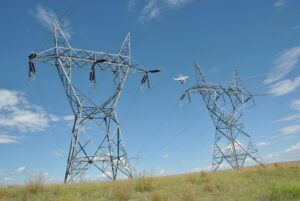Cheaper Sensors for Drone Powerline Inspections: Chiba University Researchers Unveil Breakthrough Low-Cost UAV Solution
 Associate Professor Satoshi Suzuki and Team Pioneer Affordable Solutions with Innovative GNSS-Based Drone, Redefining Precision in Close-Range Powerline Inspection
Associate Professor Satoshi Suzuki and Team Pioneer Affordable Solutions with Innovative GNSS-Based Drone, Redefining Precision in Close-Range Powerline Inspection
by DRONELIFE Staff Writer Ian J. McNabb
A team of researchers led by Associate Professor Satoshi Suzuki from Chiba University recently announced that they had developed an innovative new low-cost UAV designed for powerline inspection. While most inspection-focused UAVs use expensive and complex sensor systems to ensure accuracy, the researchers claim that their new drone, using a low-cost GNSS system, RGB camera and a millimeter wave radar, can achieve equally or more accurate results at close range, providing a more accessible alternative.
Using the comparatively simple sensor package, the drone identifies power lines and implements a knowledge-based line ID system, which employs a technique called Hough Transform to stay in extremely close proximity without colliding. In addition, a heading correction module counters the effects of magnetic fields on the UAV’s internal compass, calculating the desired direction via specified start and end points and mapping accordingly. Because of the comparatively low accuracy of the GNSS system, the researchers implemented a waypoint correction system to address the mismatch between the plotted and actual positions of the drone. Finally, environmental factors affecting flight path (like strong winds) are countered via an auxiliary controller.
After testing on a 10kv line, the proposed method effectively addressed magnetic interference and hewed closely to the plotted route, but researchers were careful to highlight that improved control algorithms could improve the already impressive results even further. Dr. Suzuki said, “By addressing the challenge of remote inspections, this method can ensure an uninterrupted electricity supply, contributing to the sustainable development goal of ensuring access to clean and affordable energy. Moreover, this method also holds the potential for carrying out automated maintenance work.”
The full paper, including more detailed methodology and technology information, is available here. The study was first published in Remote Sensing.
Read more:
Ian McNabb is a staff writer based in Boston, MA. His interests include geopolitics, emerging technologies, environmental sustainability, and Boston College sports.


